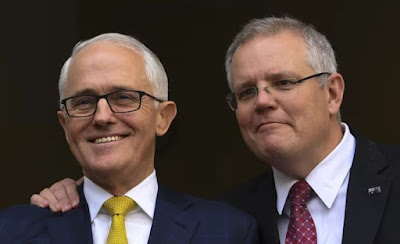What Were They Thinking? It’s probably fair to say that “Queen Jacinda’s” response to the "Crisis of Business Confidence" would be somewhat more robust than inviting Air New Zealand CEO, Chris Luxon, to chair a Business Advisory Council!
IN ENGLISH LAW “compassing the king’s death” was treason.
“Compassing”, in this context, meant ‘imagining’, ‘contriving’ or ‘plotting’.
Medieval jurists held fast to the notion that the thought is father to the
deed. Which made even thinking about the king’s death a capital crime. After
all, if the Gospel of Matthew (5:27-28) could hold that “whosoever looketh on a
woman to lust after her hath committed adultery with her already in his heart”,
then any subject looking darkly upon the monarch was, at the very least, guilty
of entertaining treasonous thoughts about his future. Thought Crime existed
long before George Orwell’s Nineteen
Eighty-Four.
It would be interesting to live in a world where simply
thinking negative thoughts about important people and institutions could get
you arrested. What would become of business leaders, for example, if they were
shown to have consistently experienced (let alone given voice to) a woeful lack
of confidence in the personnel and policies of the Government? Such negativity
would, almost certainly, be drawn to the “monarch’s” attention. How would she
respond?
It’s probably fair to say that “Queen Jacinda’s” response
would be somewhat more robust than inviting Air New Zealand CEO, Chris Luxon,
to chair a Business Advisory Council!
One can easily imagine her humbler subjects demanding that
she take a very hard line with such rebellious noblemen. After all, compassing
the demise of the kingdom’s economy strikes directly at the livelihoods of
tens-of-thousands of hard-working men and women. Excessive business negativity
costs jobs. It stymies much needed investment. Taken to extremes, it can
seriously jeopardise the economic well-being of the entire country. It’s hard
to see “Queen Jacinda” regarding this as anything other than economic treason.
In the Middle Ages, rebellious nobles faced not only
execution, but also the complete forfeiture of their estates to the Crown. Were
such draconian powers still available to the leaders of today, then it is easy
to predict the outcome of what most of the country’s leading economists have characterised
as a completely unwarranted “Crisis of Business Confidence”.
Queen Jacinda’s Attorney-General, David Parker, would be
asked to draft her a sheaf of all-purpose Bills of Attainder which she would
then pass over to her Justice Minister, Andrew Little, for presentation to the
House.
Bill of Attainder? Oh, these were extraordinary documents! A
“Bill” or, once passed, an “Act of Attainder” was a piece of legislation
declaring a person or persons guilty of a crime, or crimes, without the irksome
necessity of first securing their conviction in an ordinary court of law.
Essentially, Bills of Attainder forced their victims to undergo “Trial by
Parliament” (in the United States they call this “Impeachment”) in which the
role of the jury was played by the assembled parliamentarians. A simple
majority was enough to strip “over-mighty” subjects of their titles, offices, properties
– even their lives.
With Lord Shane Jones playing the role of the Queen’s
Special Prosecutor, it isn’t difficult to predict how these Trials by
Parliament would go. The rebellious business barons would be found guilty of “Compassing
the Death of the Economy” and their companies and corporations would be
declared forfeit to the Crown. “Nationalisation”, you see, goes back a lot
further than the Twentieth Century!
And what about Master Simon Bridges? Surely, Queen Jacinda
and her counsellors have a strong prima
facie case that he is not only the prime mover in this plot to kill the
economy, but that he also intended the misfortunes flowing from its demise to
effect the political death of the Queen?
Did he not declare on Thursday, 30th August that: “Business
confidence has slumped further to levels not seen since the global financial
crisis 10 years ago. This time the crisis is of the Government’s own making and
the return to duty of the Prime Minister a month ago has only made it worse.”
No loyal subject of Queen Jacinda could read those words
without forming the strong conviction that Master Bridges means his monarch
harm. That he has already committed treason against her in his heart.
“Convey him to the Tower! Prepare the Bill of Attainder!
Fetch timber for the scaffold! Sharpen the axe!”
This essay was
originally posted on The Daily Blog
of Friday, 31 August 2018.















